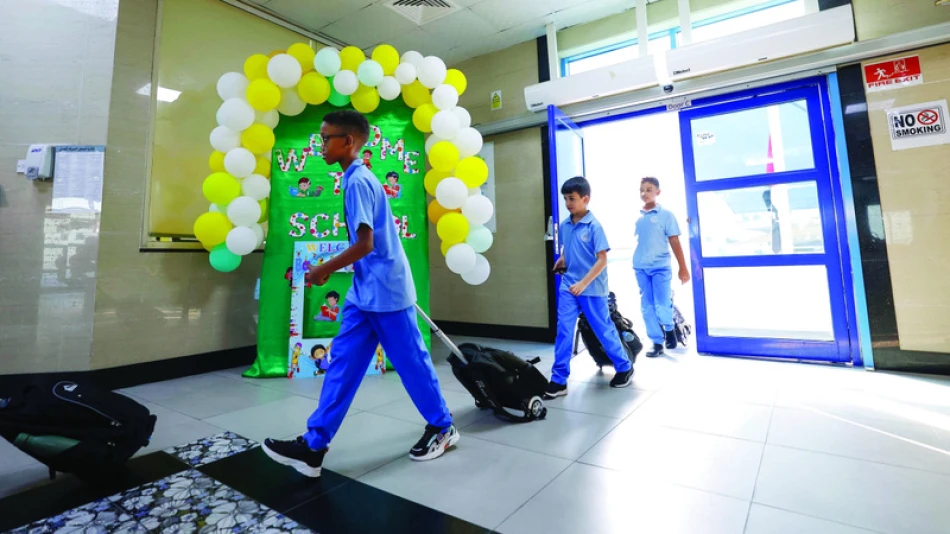
Student Movement Restrictions: Private Schools Require Chaperones for Under-15s
Abu Dhabi Tightens School Security with Mandatory Adult Supervision for Under-15 Students
Private schools in Abu Dhabi have implemented sweeping new security measures that prohibit children under 15 from arriving at or leaving school without adult supervision. The policy, mandated by the Department of Education and Knowledge (ADEK), represents one of the most comprehensive student safety overhauls in the region, requiring schools to provide supervision up to 45 minutes before classes begin and 90 minutes after they end.
Comprehensive Transportation Restrictions Take Effect
The new regulations fundamentally change how younger students can travel to and from school. Children under 15 are now banned from walking to school unaccompanied, using taxis without adult supervision, or traveling via private transport or non-school buses without a guardian present. Only third-cycle students (typically ages 15-18) retain the privilege of independent school travel, and even then, only with written parental consent.
Schools have given families until next Monday to arrange appropriate supervision, acknowledging the policy may cause inconvenience but emphasizing that student safety takes absolute priority. Notably, ADEK has refused to grant exceptions even for students living near their schools who previously walked independently.
Strict Identity Verification and Authorization Protocols
The new framework establishes rigorous pickup and drop-off procedures that mirror security protocols typically seen at international schools in high-security environments. Parents must pre-register authorized individuals who can collect their children, providing identification documents for verification. For emergency situations or last-minute changes, parents must contact schools directly to authorize alternative pickup arrangements.
Enhanced Security Infrastructure
Schools must now maintain security guards at all entry points during operational hours, with mandatory visitor logs recording names, ID numbers, and visit purposes. The policy requires schools to implement systems for managing security breaches and preventing unauthorized access to both facilities and confidential information.
Regional Context and International Comparisons
This policy positions Abu Dhabi among the most security-conscious education jurisdictions globally, surpassing measures in many Western countries where children commonly travel to school independently from age 10-12. The move aligns with broader UAE initiatives to enhance child protection following several high-profile safety incidents across the Gulf region in recent years.
Similar comprehensive school security measures have been implemented in Singapore and parts of the United States following safety concerns, though few jurisdictions have adopted such blanket age-based restrictions on independent travel.
Implementation Challenges and Market Impact
The policy creates immediate logistical challenges for working families, particularly those with multiple children or limited transportation options. Private transportation services and school bus operators may see increased demand, while families face additional costs for extended supervision services.
Schools must now budget for extended supervision periods and enhanced security infrastructure, costs that will likely be passed to families through fee adjustments. The 90-minute post-school supervision requirement effectively extends the school day for staff, impacting operational expenses significantly.
Legal Accountability Framework
ADEK has established clear legal consequences for non-compliance, with schools facing potential penalties under education regulations and broader UAE criminal law. The department reserves the right to intervene directly if schools fail to meet their obligations, creating strong incentives for strict adherence.
Schools must collect signed liability waivers from parents of third-cycle students who choose independent transportation, explicitly transferring responsibility away from educational institutions for non-school transport incidents.
Long-term Implications for Student Independence
The policy represents a significant shift toward institutional rather than parental responsibility for student welfare, potentially impacting how children develop independence and navigation skills. While prioritizing safety, the measures may delay the development of self-reliance typically gained through independent school travel.
The success of this comprehensive approach will likely influence education policy across the broader Gulf region, as other emirates and neighboring countries observe the implementation outcomes and their impact on student safety statistics.
Most Viewed News

 Sara Khaled
Sara Khaled






